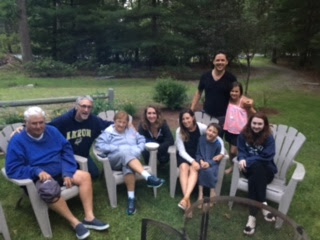2017…
Julie & Jemma, Brian & Casey, Philip
& Lauren, Mom & Dad, family & friends, Roundhouse & Squarehouse,
Snow Day, Jemma Lemma DingDong, Noto, IIA fundraiser, Keybank, Harry C & Playground, Women’s Network, city council,
Social Code, Ben Sasse and JD Vance, teaching through game playing, composting
piles and tree herding, Charlottesville, Goodbye Annie, Hello Boomer, Fire
& Fury & crotch grabbing & police shootings, Colin respectfully
kneels, Puerto Rico ignored, who lost the 2016 election, a shared commitment to
aggressively not listen to competing perspectives, Meet John Doe rains windfall
on self and top 1% buddies, anti-intellectualism takes center stage white
house, thin-skinned juvenocracy masquerading as governance (the problem with
disruption alone as an approach to leadership)…
Thankful. Yes, there is a high risk that our petulant president will destroy the planet in a nuclear war started only to boost his poll numbers...but I remain thankful to share my life with Jules and the gang, to teach, to work with amazing colleagues, to live in Akron and Charlestown. Very thankful.
Thankful. Yes, there is a high risk that our petulant president will destroy the planet in a nuclear war started only to boost his poll numbers...but I remain thankful to share my life with Jules and the gang, to teach, to work with amazing colleagues, to live in Akron and Charlestown. Very thankful.
"When it seems like
people are voting against their interests, I have probably failed to
understand their interests." This is the quote this year that
challenged me most to rethink my own approach to the conflicts we face today
(and, just to be clear, JD Vance’s book is garbage and he is a phony.)
Many threads came together this year to push me to think more deeply
about race and racial conflict. As we watched counterprotesters in Charlottesville and yet were repulsed by the president’s suggestion that both
sides were to blame; as we watched more police shootings and were repulsed by
the president’s suggestion that respectfully kneeling in protest was somehow
disrespectful to veterans; as we watched white supremacists take positions as
top presidential advisers and were repulsed by the president’s suggestion that
removing monuments to our nation’s history of racism was itself racist …it became more important, for me at least, to again sort out the
meaning of racism.
“Racism is about the abuse of power and
privilege. If your race denies you power and privilege, then you can’t be
racist.”
This
definition is persuasive to me. And important. It is about power &
resources, institutions, processes, and traditions.
At
the same time, one of the many reasons these conflicts become gnarly is that I
do not get to decide what is important. One side does not get to decide the
definition of the phenomena in question—this is always part of the conflict
itself, usually the most important part.
So,
persuasive to me is not enough. Persuasive to my group or sect or party—not
enough.
To
work toward resolution or a better understanding requires us to try to achieve agreements (including on
the definition of key terms). These cannot be imposed at the start to stack the
deck to favor our own side, but instead are creative & collaborative
efforts to dialogue in inclusive ways that account for the concerns and
experiences of as many parties as possible.
What
if we accept these two dictionary definitions as an approximate statement of
what someone mobilizing a non-academic understanding of racism might be
thinking?
“Prejudice, discrimination, or
antagonism directed against someone of a different race based on the belief
that one's own race is superior.”
“The belief that all members of each
race possess characteristics or abilities specific to that race, especially so
as to distinguish it as inferior or superior to another race or races.”
These
share the idea that racism is an antagonism
based on race (that is, active
hostility based on race). Before we dismiss out of hand the use of dictionary
definitions for such a loaded concept, consider this: anyone who might see
racism operating in reverse, as wrong-headed as we might think they are, might
be observing an antagonism based on race.
For
me, this changes our question and reframes our challenge.
When
someone brings a lens that mobilizes these more ordinary language
understandings of racism we need to recognize that this has its own internal
logic. It makes sense to them and
simply asserting that it is incorrect is unlikely to persuade them or improve
the situation.
This
is where we need to be able to translate on the fly.
This
is where, if we believe it is about power, that we need to use our alternative understanding to demonstrate that it helps us see more clearly and find better solutions to real
problems—not to simple assert our correctness to silence their incorrectness.
We
have internalized a powerful argument that has resulted in us concluding that
racism, dictionary notwithstanding, is about power imbalances and privileges
allocated on the basis of race.
From
this perspective, the ordinary language understanding of antagonism based on race is a
rudimentary starting point. But it is a real-world starting point and where we need to
start if we want to persuade.
For
me, this is one instance of a larger point from 2017: we all need to do a
better job of listening to others, particularly those who see and experience
the world differently than we do, and to then use this listening to find ways
(together) to think & talk about the challenges we face in ways that do not silence
or dismiss our opposition by fiat—but instead, name the challenges in ways that
make achieving agreements, no matter how small, more likely.
Thankful for family & friends in 2017 and hopeful that 2018 will see more listening, empathy, reaching out, humility and appreciation.
Thankful for family & friends in 2017 and hopeful that 2018 will see more listening, empathy, reaching out, humility and appreciation.










No comments:
Post a Comment